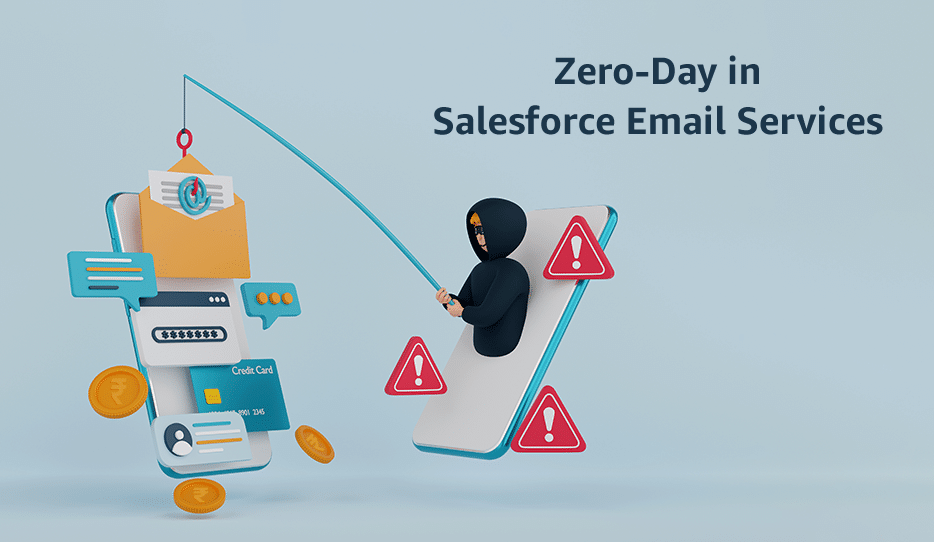
A recent spear-phishing campaign has brought to light the significance of staying vigilant against advanced hacking techniques. A leading cybersecurity research team, recently uncovered a sophisticated attack that exploited a zero-day in Salesforce email services and SMTP servers. This vulnerability breach highlighted the cunning tactics used by threat actors to target unsuspecting victims, underlining the importance of robust security measures.
The dual threat
The zero-day vulnerability in Salesforce email services enabled the attackers to devise convincing phishing emails that could bypass conventional detection mechanisms, effectively evading suspicion.
In a strategic move to further disguise themselves, the threat actors exploited a combination of the Salesforce vulnerability and legacy systems within Facebook’s web games platform. By carefully chaining these elements together, the attackers were able to pose a dual threat that aimed at compromising victims’ security from multiple angles.
An ingenious spear-phishing scheme
Central to this campaign was an intricately composed spear-phishing email, purportedly sent from Meta (formerly known as Facebook), using the trusted Salesforce domain “@salesforce.com.” The message aimed to manipulate recipients by luring them into clicking on a phishing link.
The content of the email contained high-alert notices about the victim’s involvement in impersonation, cleverly creating a sense of urgency and vulnerability.
To heighten the authenticity of the phishing email, it was meticulously personalized with the recipient’s real name and appeared to originate from “Meta Platforms.” This level of detail was intended to disarm recipients’ suspicions and make the email appear genuine.
The unfolding attack
Upon falling into the attackers’ trap and clicking on the link provided in the email, victims were directed to a malicious landing page. This fraudulent page was cunningly hosted under the guise of a Facebook game on the domain apps.facebook.com.
This tactic aimed to convince victims that they were interacting with an official “Meta Support” page, making it incredibly difficult to discern the deception.
This technique allowed the attackers to effectively capture victims’ Facebook account credentials and even their two-factor authentication (2FA) codes. By exploiting the familiarity and trust associated with the Facebook platform, threat actors managed to operate under the radar, bypassing traditional anti-spam and anti-phishing defences.
“So it’s a no-brainer why we’ve seen this email slipping through traditional anti-spam and anti-phishing mechanisms. It includes legit links (to facebook.com) and is sent from a legit email address of @salesforce.com, one of the world’s leading CRM providers.” reads the analysis.
Understanding the attack vector
The research team that uncovered the scam conducted an in-depth analysis and fished out the mechanics behind this intricate attack vector.
The attackers leveraged the Email Gateway component of the Salesforce CRM system to send a high volume of seemingly legitimate email notifications and messages to customers. The system’s domain ownership validation was manipulated, allowing the attackers to send emails that appeared to be from authentic brands.
A closer look at the email headers revealed an intriguing detail: the sender was indeed a user from the salesforce.com domain, employing the SMTP gateway typically used for mass-emailing. Further investigation revealed that the ‘From’ address domain was dynamically generated, utilizing a sub-domain pattern involving the term “case.”
This further shed light on the attackers’ utilization of Salesforce’s “Email-To-Case” feature, which automatically converts customer inbound emails into actionable tickets.
Raising the alarm: Swift response and resolution
Recognizing the gravity of this breach, the cyber security researchers promptly reported their findings to Salesforce on June 28, 2023.
The swift action taken by the cybersecurity community and Salesforce’s responsible approach ensured that the zero-day vulnerability was addressed within a month, by July 28, 2023.
The incident serves as a stark reminder of the ever-evolving and sophisticated techniques employed by cybercriminals. Vigilance, robust security measures, and prompt responses are crucial in safeguarding individuals and organizations from such targeted attacks.
As we continue to witness the evolving landscape of cybersecurity threats, the battle to stay one step ahead with advanced emerging tactics remains ongoing.